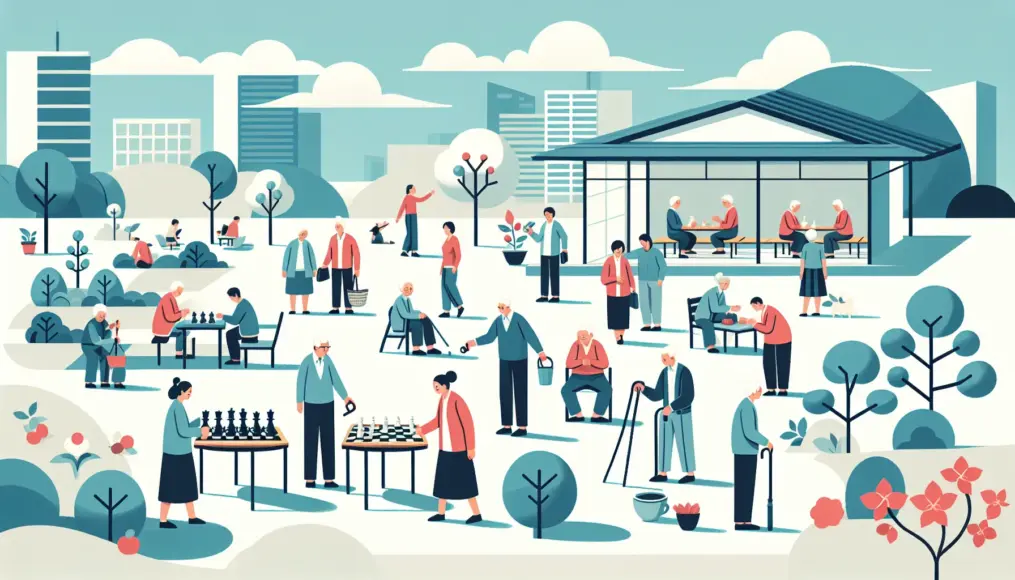The aging population is having a profound effect on our daily lives. As the demographic shifts toward an older population, various social challenges are coming to the forefront. It’s vital for us to reflect on how we can navigate these changes by understanding the realities of elderly life and listening to voices from the caregiving sector.
We also need to carefully consider the future of our healthcare and pension systems. Let’s think together about how we can shape the society ahead of us. We will explore the realities and future of an aging society, taking into account the role of technology and community involvement.
- Analyzing the current state of aging society through demographics
- Sharing experiences from the caregiving field and the pursuits of older adults
- Exploring challenges in healthcare and pension systems along with future prospects
Understanding the Current State of an Aging Society
Our society is rapidly aging, and the increasing proportion of elderly individuals is having a wide range of impacts. This demographic shift is prompting changes in our lifestyles and the structure of our communities. Aging presents new challenges, and how we respond to these changes is crucial.
In this section, we will take a closer look at the current state of our aging society through demographic data and the realities of elderly living. By understanding this information, we can uncover insights that may help improve the quality of life for seniors and their roles in the future social landscape.
Demographics of Aging
To grasp the concept of an aging society, it’s essential to examine the demographics involved. Japan’s population structure is undergoing rapid transformation, with a growing percentage of elderly individuals. This shift is largely due to advancements in medical technology and improved living standards, which have extended average life expectancy.
In response to this situation, governments and local communities are exploring policies to support the elderly. However, many challenges still exist for seniors, necessitating concerted efforts to address these issues.
- The proportion of elderly individuals in Japan is increasing each year.
- The rise in average life expectancy is a significant factor in aging.
- Governments and communities are seeking policies to support seniors.
Realities of Elderly Life
Examining the realities of elderly living reveals various challenges. Issues such as social isolation, economic insecurity, and health concerns are prevalent. Particularly for seniors living at home, many face obstacles that can hinder their daily lives.
It’s also vital to consider how older adults engage with their communities. Strong local connections and support can lead to a more fulfilling life. Therefore, fostering a community-wide awareness of the need to support the elderly is essential.
If you’ve gained a deeper understanding of the current state of our aging society through this article, we encourage you to also check out this article: “Future Outlook of the National Pension System! Key Points You Should Know.” It delves into the necessary changes in systems and policies that support the lives of the elderly. There’s a wealth of valuable insights that can enhance your understanding of the societal changes accompanying aging.
- Seniors may experience isolation and economic insecurity.
- There is a strong demand for health-related support.
- Community support is key to enhancing the quality of life for the elderly.
Insights from an Aging Society
Personal experiences within an aging society are crucial for understanding the changes we face and how we should respond to them. The voices of caregivers and elderly individuals themselves serve as invaluable sources of information, shedding light on the current state of society. By exploring their stories, we can uncover the challenges they encounter as well as the joys and sense of purpose they experience.
In this section, we will share firsthand accounts from those in the caregiving field, focusing on how elderly individuals find meaning in their lives and navigate their day-to-day existence. This exploration will deepen our understanding of the aging society.
Voices from the Caregiving Field
The caregiving environment presents various challenges, yet it is also a source of many poignant stories. Caregivers often find fulfillment in their work as they connect with elderly individuals, gaining insight into their life experiences and wisdom. However, the physical and emotional burdens can be significant, highlighting the urgent need for improvements in caregiving conditions.
For elderly individuals receiving care, the quality of life can dramatically change with the right support from those around them, making community connections immensely important. Listening to the voices of caregivers can inspire us to think about better ways to provide support.
- Caregivers often feel a sense of purpose as they engage with the life experiences of the elderly.
- The physical and emotional demands are considerable, necessitating improvements in the caregiving environment.
- Community connections contribute significantly to enhancing the quality of life for older adults.
What Gives Elderly Individuals a Sense of Purpose?
For older adults, a sense of purpose is found in the joys and objectives they experience in their daily lives. Various elements contribute to this sense of purpose, including hobbies, community activities, and family interactions. Notably, connections with peers and new challenges often energize elderly individuals.
Engaging with society allows older adults to reaffirm their sense of identity and leads to a more fulfilling life. Discovering a sense of purpose is vital for improving mental health and overall quality of life.
If you want to deepen your understanding of the voices from the caregiving field and the sense of purpose among elderly individuals, we recommend checking out this article, “Considering the Economic and Social Impact of Declining Birth Rates.” It explores the implications of declining birth rates on society as a whole and offers insights into the future of our aging society.
- A sense of purpose for older adults emerges from hobbies, community activities, and family interactions.
- Connections with peers often provide a vital source of energy.
- Engagement with society enhances mental health and quality of life.
Challenges Facing Society
As our society continues to age, we are confronted with a variety of challenges. Among these, the issues surrounding healthcare and pension systems stand out as particularly critical. With the growing number of elderly individuals, the burden on these systems has become increasingly heavy, raising concerns about their sustainability. Addressing these challenges requires sound policies and collaboration within our communities.
In this section, we’ll take a closer look at the pressures on the healthcare system and the future of pensions. These issues directly impact our lives, and it’s essential to have a solid understanding of them.
Pressures on the Healthcare System
As the population ages, the healthcare system faces significant strain. Many elderly individuals suffer from chronic illnesses, leading to a rising demand for medical services. At the same time, securing healthcare professionals and effectively allocating medical resources are pressing challenges. Furthermore, the increasing costs of healthcare are having a major impact on the finances of both the national and local governments.
This situation raises important questions about the sustainability of our healthcare system, making it urgent to establish an efficient healthcare delivery framework. The introduction of new technologies and the enhancement of community healthcare services are essential steps forward.
- The demand for healthcare services among the elderly is rising
- Securing healthcare professionals and resource allocation are challenges
- The sustainability of the healthcare system is in question
The Future of the Pension System
The pension system is also a significant issue in our aging society. As the number of elderly individuals increases, the working-age population that supports pensions is decreasing. This raises concerns about the sustainability of the pension system, leading to discussions about potential reductions in pension payouts and increases in the retirement age.
Additionally, as reforms to the pension system are called for, the importance of individual asset accumulation and life planning is becoming more pronounced. We need to consider the options available to us to prepare for the future.
In this article, we’ve examined the sustainability of healthcare and pension systems in the context of an aging society, but fiscal issues are also a major factor. If you’re interested, I recommend checking out this article, “The Impact of Fiscal Deficits: Exploring the Complex Relationship Between Economics and Politics,” which will deepen your understanding of how economic policies affect society.
- The number of working-age individuals supporting pensions is decreasing
- Consideration is being given to reducing pension amounts and raising the retirement age
- The importance of individual asset accumulation is increasing
Envisioning the Future
As our society ages, it’s crucial that we start imagining a new future. In this context, leveraging technology and the role of community are key components. By effectively combining these elements, we can create an environment where seniors can lead more fulfilling lives. The goal is to foster initiatives that pave the way for a society where everyone can live with peace of mind.
In this section, we will explore how technology can be utilized and the vital role that communities play. Let’s take a closer look at how these factors can support the lives of seniors and help build a better future.
Harnessing Technology
Technology holds tremendous potential in addressing the challenges of an aging society. For instance, in the fields of health management and medical care, telemedicine and health management apps are becoming commonplace, allowing seniors to live securely in their own homes. Additionally, the proliferation of caregiving robots and AI-driven services is helping to reduce the burden on caregivers while providing higher-quality assistance.
Moreover, advancements in communication tools are strengthening connections among seniors and their families, serving as a means to prevent isolation. By leveraging technology, we can significantly enhance the quality of life for older adults.
- Telemedicine and health management apps are becoming widespread
- Caregiving robots and AI services alleviate caregiving burdens
- Communication tools contribute to preventing isolation
The Role of Community
Community plays a vital role in supporting an aging society. With strong local connections and support, seniors can live with greater reassurance. Through community activities and volunteer efforts, interactions among residents are encouraged, contributing to a sense of purpose for older adults.
Furthermore, a robust welfare system and services tailored to the needs of seniors can provide essential support. Cultivating a community-wide awareness of the importance of supporting older adults is essential for building a better society.
- Community connections support seniors’ lives
- Community activities and volunteerism promote interaction
- Enhanced welfare systems and services meet seniors’ needs
Conclusion
As our society ages, we are encountering numerous challenges that impact our daily lives. With the burdens on healthcare and pension systems increasing, there’s a growing emphasis on leveraging technology and the role of community support. It’s essential to create an environment where seniors can live comfortably and with peace of mind.
Furthermore, valuing the sense of purpose and connections that older adults have within their communities can lead to richer, more fulfilling lives. It’s crucial for each of us to reflect on how we want to shape the future of our society.
- The effects of an aging society are particularly evident in healthcare and pension systems.
- Technology and community support play vital roles.
- The sense of purpose and community connections for seniors enhance their quality of life.
Let’s explore together how we can navigate the challenges of an aging society. We would love to hear your thoughts in the comments!



Comment